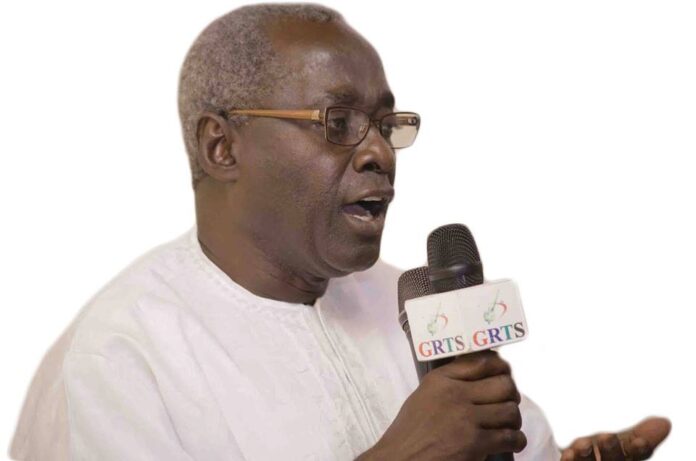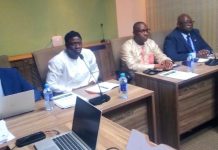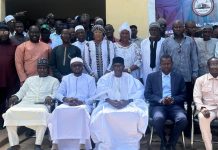By Momodou Jarju
The national assembly member for Serrekunda has used part of his debate-time on The Gambia Promulgation Bill 2020 on Wednesday to dissect the procedures undertaken by the Constitutional Review Commission (CRC) to chart a way forward as Gambians move closer to welcoming the third republic.
Amid avid anticipation of the debate by the general populate, Halifa Sallah said the bill is a byproduct of their own actions as national assembly members, because they passed the bill that gave rights for the establishment of the Constitutional Review Commission (CRC) in 2017.
He said section 6 of the CRC Act states very clear that the functions of the Commission are to draft a new constitution and prepare a report in relation to the constitution.
Sallah said what is amazing is that the report of the CRC gave them references of the consultative process and the literature review that they had undertaken in order to come up with the draft.
“And part of references that I can see, 32 Malawi citizenship act, 33 Malawi constitution, 34 Kenya constitution,” he said.
Mr. Sallah also commented on the issue of plagiarism as some parliamentarians said the drafters of the constitution copied from other countries’ constitution which they opined is plagiarism.
“Plagiarism is to quote without making reference and ensuring that you give authority to where authority is due. This parliament is not an ordinary institution, outsiders cannot come and stand here and speak. Before we make allegations we must make sure they are situated in truth. Otherwise we are undermining the integrity of this national assembly,” he explained.
Speaking further, Mr. Sallah said the national assembly charged the CRC with the responsibility of carrying out its function under section 1 of the Constitutional Review Commission Act to seek public opinion and take into account such proposals as it Considers Appropriate (with emphasis on both words).
He said considers appropriate has content, form and context.
“You cannot consider any matter without checking the context. What are you able to do? And you have to make reference to time. How much time do you have to do with? All these matters… So if we are to gauge, we must gauge based on those standards,” he remarked.
The veteran politician also said the CRC was supposed to review the 1997 constitution, therefore if provisions of the 1997 constitution are embedded in the draft constitution, “that’s what is supposed to happen.”
If they are convinced that those provisions are authentic and should be there, that’s the duty you’ve given them, he added.
“Everything that is embedded in this draft lie on a foundation of principle… Principles can be mere ideas, but it can also be concrete law and that’s what they had sought to do; to provide the principles and then make the law, so that you know why the law is there for us to be able to gauge whether they have actually served us in the right way,” he said.
Sallah also indicated that they (national assembly members) instructed the CRC to ensure term limit as well as The Gambia continuing to be a secular state.
“We are all sovereign. We own The Gambia. We are all voters. We belong to different religions. It’s said that all faiths must be respected. Imagine the debate that this generated, people talking about everything in the sky except what a constitution is. And what a constitution is; is a mundane instrument. You look at the 1965 constitution, what is there? That the executive power lies in Her Majesty, in which religious book will you find that? That’s a mundane instrument. We moved away from that up to the 1970 constitution giving you the authority to determine your manner of existence. To the 1997 {constitution} and now we are thinking of moving forward. It moves qualitatively from one stage to another. That’s what development is all about,” he explained.
Mr. Sallah said their duty on Wednesday’s debate on the draft constitution is “about development” which is the object to move forward. Thus, he said they must ask themselves the question whether they have the instrument that can help them move to the next stage and continue to move higher and higher stages.
“We will never get there because development will always be higher and highest stages. So the context must determine content and must determine form. The context in which we are in honorable speaker is that we inherited a 1997 constitution. We’ve been using the constitution. You can see how much it has served us to be able to vet appointments up to the Office of the Ombudsman, we rejected; you can see then the powers we have under the constitution (1997) and because of our ignorant we could not even utilize the constitution because some people continue to say a soldier’s constitution,” he said.
“But then we can see the powers we have to the point of determining our own income when the executive rejected it, but we relied on the constitution that by force they must do it. And the Accountant General had to do it because of what was read in the constitution. We could not master our own domain and to be the architect of our own destiny by virtue of ignorance. And that ignorance must not continue to be replicated by not understanding what is before us, honorable speaker,” he added.
Sallah said the CRC did what the national assembly assigned them to do. Thus, he queried on whether they wanted to transform themselves into drafters.
“Then why did we assign them the responsibility? Why didn’t we do it ourselves? Because that was said in the first place honorable speaker, that they are asking us to promulgate on the basis of section 226 of the constitution,” he indicated.
Sallah explained that section 226 has two elements and those two elements cannot be the same. One element, he said are the provisions in the 1997 constitution that can be amended through and by the parliament without having to send anything to anybody for a referendum and that was very clearly stipulated under section 226 (1-3).
He said the national assembly does not have monopoly on the draft constitution like it has with other laws where when they pass a bill the president must assent to it or return it to them; and when they return it to the president then by force he must assent.
“But when it comes to the constitution when he rejects, we must go for a referendum. So there is nothing we can do here, change anything that we believe whatever we change is something that must go to the president and if he rejects it {that is changes they may make} it goes to a referendum,” he said.
“Now what is the second element? The second element deals with subsection 4-7. It says that a bill for an act of the national assembly altering any provisions referred to in subsection 7 and subsection 7 those are the entrenched clauses, so when you have the entrenched clause, shall not be passed. We are not supposed to even pass it. Shall not be passed by the national assembly or presented to the president for assent.
“So is not even passed and is not presented to the president. So what happens here? It says that a bill of that nature unless the bill is published and introduced in the manner required by paragraph A of subsection 2 which we have passed.
“Honorable speaker it is important that the IEC scheduling a referendum in June 2021 according to its calendar. So you see how things change and it is this national assembly that should be the game changer. This is our responsibility that is why we are an oversight institution. All these people are coming to us with hope that a way must be found to be able to address the context that we find ourselves. So honorable speaker it is emphasizing that how will it pass? At least 50% that are entitled to vote in the referendum had taken part in the referendum and the bill is supported in the referendum by at least 75% of those who voted,” he explained.
Sallah also said the critical situation they have is that the draft constitution has both provisions which touched on the entrenched clauses and provisions which they can change in the national assembly.
He said that’s why when they started the debate it was felt that going and changing what they could and going for a referendum to the others maybe would have been the best judgment.
“But that is history. Now we have taken this route, how do we come at a level where we say light is at the end of the tunnel? That is really what we must discuss, that’s the essence of what we are doing here. We are looking at the merits of the law to assist us to achieve the objects and reasons that are put before us; promulgation of the draft constitution and repeal of the 1997 constitution. How are we going to achieve that?” he said.
On how can national assembly promulgates a constitution that has both entrenched and non-entrenched clauses, Halifa Sallah said it is important for parliamentarians to look at the issue critically likewise the mover of the bill, Minister Dawda Jallow, so that they know where they are going.
Sallah quizzed whether the IEC is ready to conduct a referendum within six month. He said the IEC is envisaging 2021 June.
“So in that regard, could we resort to something else to try to remedy the situation? Look at section 102. Section 102 of the constitution honorable speaker is actually telling us that section 102 (E) that any bill introduced in the national assembly may include in the bill a proposal for a referendum on an issue of national concern defined in the bill.
“Of course promulgation of a new constitution is a national concern. The mover should look into this possibility and see whether we could not add 226 with 102 together. Somehow move towards a referendum where it would be introduced in the bill that we move to a referendum and members it is clear that if we touch even a scratch in this and we believe we have power to do so we must sent it to the president and if he rejects it, we go for a referendum.
Sallah said the Constitutional Review Commission shall upon the completion of its work submit a constitution and report thereon to the president which has been done. He said thereafter, it was supposed to be published in a gazette and that has been done too. He said the issue is not about the executive but the lawmakers because the executive did not touch it.



















